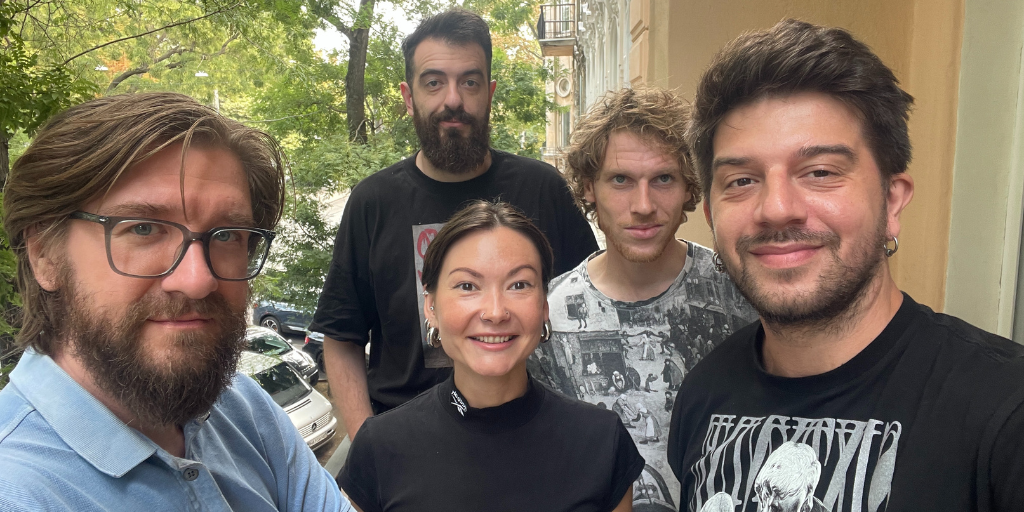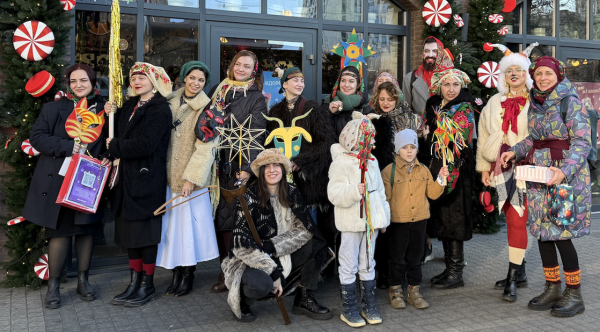
“Odesa is a vibrant and active city with a big pro-Ukrainian community. But it is not always portrayed like this. We want to present a true image of Odesa, full of inspiring and patriotic individuals, and we want to promote Ukrainian culture as we report on the city life,” says Veronika Polyakova, head and founder of “More Liudei” or “Sea of People”, a media project based in Odesa in southern Ukraine.
Launched at the beginning of 2024, More Liudei started out as a volunteer organisation to create positive content to lift people’s spirits during the war. In a short space of time, it has become a reputable media with thousands of views of each video. It focuses on the positive and inspiring individuals who are transforming Ukraine for the better.
“We’re building a platform that unites people and motivates them to stay in Ukraine, rebuild it, and defend its independence. We show them that Odesa is a Ukrainian city, which has no space for any pro-Russian narratives,” says Veronika.

Russia’s invasion of Ukraine in 2022 disrupted every aspect of life in Odesa, a city with more than a million residents. As a port on Ukraine’s Black Sea coast and on important trade routes, Odesa has been targeted by missiles and drones and the security situation remains difficult. Many residents left the city in 2022, and most media also shut down.
Veronika previously worked with EED’s partner Gwara Media, however, like many journalists in Ukraine, she lost her job due to the war.
“I’ve been in journalism for 15 years. Suddenly, many of us are out of work. When you meet people and ask what they’re doing, and the answer is ‘nothing,’ it’s unsettling. It was suffocating not to be working”, she says.
The need for action sparked an idea: to create a platform that captured Odesa’s true essence amid the war. As media began to report once more in the city, their agendas continued to be set by their owners and different political parties and ideologies. Veronika wanted an outlet that could be fully independent, balanced and accurate.
“Odesa often appears in the information space as a city clinging to old Russian-leaning narratives,” she says. “ I wanted to show the real Odesa – volunteers, socially active businesses, military personnel, and ordinary citizens doing extraordinary things. It wanted to highlight the city’s transformation as it moves toward its Ukrainian identity. I wanted to report and support those fighting to decolonise Odesa’s public spaces and consciousness.”
Veronika gathered a team of journalists around her and the journalists began producing video interviews and other content with positive and inspiring stories, which started gathering hundreds of thousands views. At first, they had no office, funds, or a website, so they focused on social media instead. Now the team of six work both as a production house and a media outlet.
“Odesa is changing, and its pro-Ukrainian voice is now stronger than ever. It needs to be supported. Odesa residents need to see examples of whom they can emulate so they, too, can get more engaged and socially active,” says Veronika.
The team began with projects like “Feeling the War” and “People’s Stories,” which spotlighted individuals contributing to Ukraine’s resistance and recovery.
“We wanted to explore people’s motivations, their emotions, and the decisions they made to go to protect their country,” she says.
One recurring theme is the perseverance of local businesses. The platform tells stories of entrepreneurs relocating their ventures to Odesa, not merely surviving but thriving.
“We don’t cover car accidents or corruption scandals,” Veronika says, “There’s already enough negativity out there. We want to highlight stories that inform and empower people to shape a better future. These stories aim to motivate and inspire people. If someone can rebuild their business after everything, others can too.”
The project’s reach extends into activism. One campaign challenged the city administration’s allocation of funds for court renovations instead of military aid. The team’s creative protest involved placards placed near bombed sites, reading messages like, “I want money for the military, not court repairs.” The campaign went viral, sparking citywide discussions and influencing budget decisions.
“We also partnered with the city’s main theatre and organised a documentary movie screening,” Veronika continues. “We showed a film by an Odesa director about the most war-affected areas of Ukraine. It talks about the hard work of evacuating civilians from these parts of the country, as more than 20,000 people were rescued. Our team helped edit the film, and we had a great attendance for the screening. This event was a chance to connect people to the realities of war and the resilience of those affected by it.”
The team is now developing a website to host longer videos and other content in addition to the social media channels, and they plan to produce text-based journalism and broader analytical pieces. An EED grant has given the team stability, as they set out on their second year of work.
“We want to contextualise what’s happening in Odesa. We will create a hub for meaningful news and event coverage, countering the “informational noise” in other local media,” she says.
One priority for the future is building an engaged community. They recently organised a first meetup with the media’s followers, where they welcomed sixty supporters.
“I am very proud of the community we’ve built,” Veronika says. “With over 20 regular donors and growing public support, we have been able to achieve stability against all odds. People recognise us on the streets. They tell us how much Odesa needed something like our project. We’re not just telling stories. We’re building a movement.”
This article reflects the views of the grantees featured and does not necessarily represent the official opinion of the EED.
This initiative was supported thanks to the contribution of the European Commission to EED.